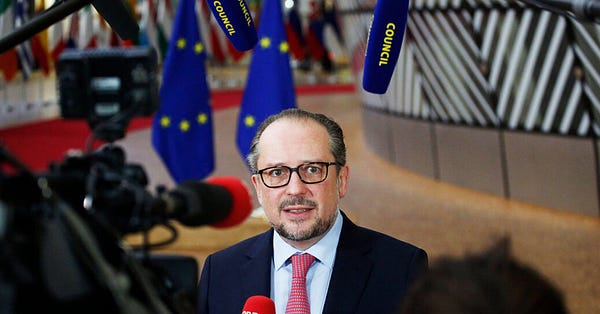Resignation, Resignation
Two ministers with close ties to former chancellor Sebastian Kurz resigned Monday days before the ÖVP's big party conference
Servus!
May is the month when the asparagus season kicks into high gear and Austrian politicians resign. As Conny Bischofberger noted in her Krone column on Tuesday, in May 2016, chancellor Werner Faymann resigned having lost the confidence of his comrades in the Social Democratic Party (SPÖ). In May 2017, vice-chancellor Reinhold Mitterlehner stepped down after Sebastian Kurz launched a coup against his leadership of the People’s Party (ÖVP). In May 2018, NEOS founder Matthias Strolz handed over the reins to Beate Meinl-Reisinger. In May 2019, the Ibiza scandal blew up and vice-chancellor Heinz-Christian Strache (Freedom Party, FPÖ) resigned in disgrace. In May 2020, Ulrike Lunacek became the first cabinet member in the new ÖVP-Green coalition to give up her post.
Now May is here again and so it was that on Monday, the political week began with not one but two ministerial resignations. First to hand in her notice was Elisabeth Köstinger, minister for agriculture and tourism. As I wrote in a tweet that ended up in the pages of the freesheet Österreich, Köstinger will be remembered as a close ally of former chancellor Kurz and for her role as the City of Vienna’s primary antagonist in the federal government. It was Köstinger who, during the first COVID-19 lockdown in March and April 2020, insisted that the city’s federally-run gardens from Schönbrunn to the Belvedere remain closed in spite of that that walking or running in the park was a perfectly safe and permissible activity.
Thank you for subscribing to the Vienna Briefing. If you know someone who might be interested in reading this newsletter, consider sharing it with them today.
The Vienna Briefing is a free newsletter. If you would like to support my work, you can send me a tip via PayPal.
A few hours later, Margarete Schramböck followed Köstinger out the door, announcing her resignation on Facebook. The minister for digitalization and the economy was one of the government’s least competent members, and her possible reshuffling, demotion, or firing had been muted for months. She practically signed her own P45 last year when her department wasted over a million Euros of taxpayer funds on Kaufhaus Österreich, a failed attempt to launch an online platform for Austrian retailers that might rival Amazon. That she wasn’t sacked when Karl Nehammer was made chancellor has a lot to do with the patronage of and protection afforded her by Tyrol governor Günther Platter.
On Tuesday, Nehammer moved to patch up the holes in his cabinet ahead of a crucial party conference on Saturday. Schramböck’s responsibilities as economy minister were handed to labor minister Martin Kocher, creating a new super-department in the process. Norbert Totschnig, hitherto director of the Austrian Farmers’ Association, an ÖVP special interest group, is to be the new agriculture minister. Beneath them will be a new secretary of state for tourism (Susanne Kraus-Winkler, a functionary in the Chamber of Commerce, a body tied to the ÖVP) and another for digitalization and broadband (Florian Tursky, last seen running Platter’s office in Tyrol).
For The New Statesman, I wrote about Austria’s opposition to expedited European Union membership for Ukraine, placing the country on the wrong side of its allies in central and eastern Europe and in a position of pushing for something Ukraine could never accept.


The post-Kurz ÖVP is a party in flux, falling in the polls and unsure of its future. Nehammer has yet to fully establish himself as its leader, and his reshuffle reflects his need above all to balance competing interests in the party. With Schramböck’s resignation, Nehammer was duty bound to appoint another son or daughter of Tyrol to the cabinet in order to appease Platter and create a certain equilibrium between the ÖVP’s demanding state governors, hence the elevation of Totschnig and Turksy. At once, Nehammer had to ensure the ÖVP’s various and numerous special interest groups—the Austrian Economic Association, the Austrian Farmers’ Association, the Austrian Workers’ Association, and on and on—were catered to with Totschnig and Kraus-Winkler’s appointments.
The time of year notwithstanding, the scheduling of Köstinger and Schramböck’s dual resignation is rather intriguing. The ÖVP is desperate to present a united front at Saturday’s party conference, at which it plans to launch a new logo, new party color, and new name, removing the ‘new’ which Kurz affixed to ‘People’s Party’ after his aforementioned accession in May 2017. Yet days out from that conference, two ministers with very close ties to Kurz—who popped up out of nowhere over the weekend with a splashy interview in the Krone—made a move that could only undermine Nehammer’s position and remind voters of the inherent schism in the party between those loyal to the former chancellor and those betting on the current one. One might be forgiven for thinking that their timing was intentional.
Bis bald!




